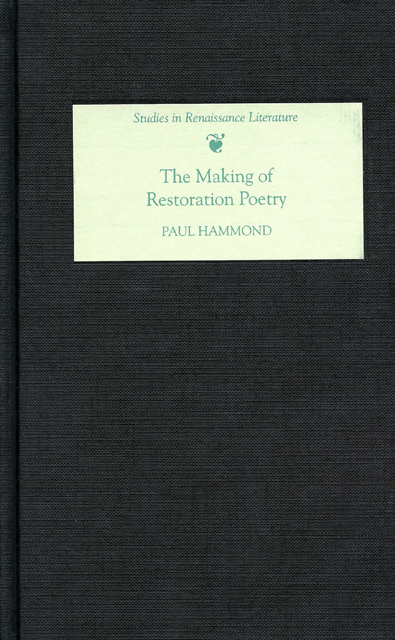1 - The Restoration Poetic Canon
Published online by Cambridge University Press: 18 March 2023
Summary
When our great monarch into exile went,
Wit and religion suffered banishment …
At length the Muses stand restored again
To that great charge which Nature did ordain.
THE IDEA, expressed here by Dryden, that the arts were restored in 1660 along with the Stuart monarchy was a commonplace of the day, and formed part of the mythological and ideological fashioning of this historical moment. The desire to represent the new king as a second Augustus, patron of poetry as well as bringer of peace and social order, was part of a movement by which this turning point in the nation's history was understood, by which the future was sketched out and the past rewritten. Retrospectively the republic is represented as a barbarous interlude, and Dryden himself quickly forgets that only a few months earlier he had written of Cromwell that ‘in his praise no arts can liberal be’.
During the early months of 1660, the presses poured out pamphlets of all kinds. In January alone, George Thomason collected two dozen verse satires against the Rump Parliament, the army, and the leaders of the republic; in February there were a further dozen satires, now interspersed with panegyrics to General Monck; in March verses began to be published favouring the restoration of Charles II, and some satires took the form of miniature plays. By April it was possible to publish an elegy on Charles I. Charles II entered London on 29 May, and by the end of July Thomason had collected some thirty separate poems or collaborative volumes of verse celebrating the Restoration.
The changing climate can be traced through the variety of bogus imprints used on these pamphlets, from the cautious ‘Printed for Philo-Basileuticus Verax’ on 6 March, to the bolder ‘Printed for Charles King’ on the 15th. Satirical imprints registered the decline of that republican and sectarian cause which had once flourished so vigorously when the printed media were opened to previously excluded political views and social classes: one pamphlet was ostensibly to be sold ‘at the signe of the Roasted Rump’, another claimed to be ‘Printed for every body but the light-heel’d Apprentices and headstrong Masters of this wincing City of London’, and a third was ‘Printed at the Charge of John Lambert, Charles Fleetwood, Arthur Hesilrig and —— Hewson the Cobler, and are to be distributed to the fainting Brethren’.
- Type
- Chapter
- Information
- The Making of Restoration Poetry , pp. 3 - 27Publisher: Boydell & BrewerPrint publication year: 2006
- 1
- Cited by

